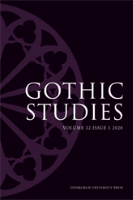
Gothic Studies
Scope & Guideline
Unearthing the Rich Tapestry of Gothic History
Introduction
Aims and Scopes
- Interdisciplinary Approaches to Gothic Literature:
The journal emphasizes interdisciplinary methodologies, integrating literary analysis with cultural studies, history, and visual arts to explore Gothic texts in diverse contexts. - Global Perspectives on Gothic:
Gothic Studies seeks to broaden the understanding of Gothic beyond Western literature, focusing on global interpretations and adaptations, including works from Latin America, Asia, and Africa. - Thematic Exploration of Gothic Tropes:
The journal consistently engages with key Gothic themes such as monstrosity, identity, trauma, and the uncanny, examining how these concepts manifest across different periods and cultures. - Contemporary Gothic and Popular Culture:
A significant focus is on contemporary manifestations of the Gothic in popular culture, including film, television, comics, and digital media, analyzing their societal implications and cultural relevance. - Historical Contextualization:
Gothic Studies places a strong emphasis on the historical contexts of Gothic literature, tracing its origins, evolution, and influences throughout different literary movements and societal changes.
Trending and Emerging
- Decolonial and Indigenous Gothic:
An emerging trend is the exploration of decolonial Gothic narratives, highlighting Indigenous perspectives and critiques of colonial histories and their Gothic implications. - Gothic in Graphic Media:
There is a growing focus on Gothic representations in graphic novels and comics, examining how visual storytelling contributes to and transforms traditional Gothic themes. - EcoGothic and Environmental Concerns:
The intersection of Gothic literature and ecological themes is gaining traction, with an emphasis on how Gothic narratives engage with environmental issues and the human-nonhuman relationship. - Posthumanism in Gothic Discourse:
Recent publications show an increasing interest in posthumanist approaches to Gothic studies, questioning human-centric narratives and exploring the Gothic implications of technology and nonhuman entities. - Cultural Trauma and Memory in Gothic Narratives:
Explorations of cultural trauma and collective memory are emerging themes, reflecting contemporary societal concerns and the role of Gothic literature in processing historical and psychological trauma.
Declining or Waning
- Traditional Victorian Gothic:
There seems to be a decreasing emphasis on traditional Victorian Gothic narratives, as contemporary scholarship shifts towards more diverse and global interpretations of Gothic literature. - Static Gender Representations:
Themes centered around static gender roles within Gothic narratives are becoming less frequent, indicating a shift towards more nuanced explorations of gender fluidity and intersectionality. - Historical Gothic Exclusivity:
The focus on exclusively historical Gothic texts is declining, with a noticeable movement towards analyzing contemporary Gothic forms and their cultural implications. - Monolithic Interpretations of Monstrosity:
The exploration of monstrosity in a monolithic sense is waning, as scholarship increasingly recognizes the multiplicity of monstrous identities and experiences across different cultures. - Narrow Cultural Contexts:
There is a noticeable decline in studies that limit Gothic analysis to narrow cultural contexts, as the journal increasingly embraces a broader, more inclusive approach to global Gothic narratives.
Similar Journals

Anclajes
Advancing Critical Discourse in HumanitiesAnclajes is a prominent academic journal dedicated to the fields of Cultural Studies, Linguistics, and Literature, published by the UNIV NACIONAL LA PAMPA, FAC CIENCIAS HUMANAS. With both print (ISSN 0329-3807) and electronic (E-ISSN 1851-4669) formats, the journal has embraced an Open Access model since 2010, greatly enhancing its accessibility and reach to a global audience. Based in Argentina, Anclajes provides a platform for innovative research and critical discourse, contributing significantly to the understanding of cultural phenomena and literary theories. In recent years, the journal has established itself with a Scopus rank placing it in the top 30% of Literature and Literary Theory and the top 57% of Cultural Studies, as indicated by its quartile rankings for 2023. With issues converging from 2012 to 2024, Anclajes continues to foster scholarly communication and serves as an essential resource for researchers, students, and professionals seeking to explore the dynamism of human culture and expression.
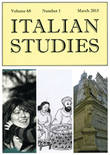
Italian Studies
Fostering Critical Dialogue in Italian Cultural StudiesItalian Studies, published by Routledge Journals, Taylor & Francis Ltd, stands as a distinguished academic platform in the fields of Cultural Studies, History, Linguistics, Language, Literature, and the Visual Arts. Established in 1937, this journal has fostered scholarly dialogue and innovation through its robust contributions and in-depth analyses that bridge historical and contemporary perspectives on Italian culture. With an impressive ranking in Q2 and Q3 quartiles across multiple categories, including Literature and Literary Theory, and a current impact factor reflecting its growing influence, Italian Studies serves as an essential resource for researchers, professionals, and students alike. Although not an open-access journal, it remains accessible via institutional subscriptions, ensuring that a wide audience can engage with its critically acclaimed research and articles. Located in the UK, Italian Studies continues to advance the understanding of Italy's rich cultural heritage, making it a vital cornerstone for those invested in the humanities and social sciences.

Journal of Austrian Studies
Illuminating the Depths of Austrian LiteratureThe Journal of Austrian Studies, published by University of Nebraska Press, serves as a vital academic platform dedicated to the exploration of Austrian culture, literature, and theory, making significant contributions to the interdisciplinary fields of Cultural Studies and Literature. Established in 2012, this esteemed journal boasts an ISSN of 2165-669X and an E-ISSN of 2327-1809, reflecting its commitment to broad scholarly communication. Despite being positioned in Q4 for Cultural Studies and Q3 for Literature and Literary Theory as of 2023, its focus on innovative research and critical discourse allows it to remain relevant in the academic community. With Scopus rankings indicating its niche yet important place among related journals, the Journal of Austrian Studies aims to foster understanding of Austria's rich cultural heritage and its contemporary implications, appealing to researchers, professionals, and students alike who seek rigorous analysis and scholarly debate. This journal provides an inclusive forum for sharing ideas and developments, contributing to the evolving dialogue in Austrian studies.

SCANDINAVICA
Elevating Critical Discourse in Cultural Studies and Literary Theory.SCANDINAVICA, published by the University of East Anglia, is a pivotal peer-reviewed journal in the fields of Cultural Studies and Literature and Literary Theory. With an ISSN of 0036-5653, the journal offers a platform for scholars and researchers to disseminate innovative research and critical insights from 2002 through 2020 and will continue to do so until 2024. Although it is not currently an open-access journal, its commitment to extensive academic discourse is reflected in its rank, with a reputable Q4 in Cultural Studies and Q3 in Literature and Literary Theory within the 2023 category quartiles. With Scopus rankings placing it in the 2nd percentile for Literature and Literary Theory and an even more esteemed 1st percentile for Cultural Studies, SCANDINAVICA stands out as an influential resource for those engaged in the vibrant intersections of cultural narratives and literary analysis. This journal serves to elevate critical discussions and foster a deeper understanding of Scandinavian cultural and literary discourses, making it an essential read for academics, students, and anyone vested in these multidimensional fields.
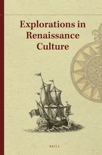
Explorations in Renaissance Culture
To Explore the Depths of Renaissance InsightsExplorations in Renaissance Culture, published by BRILL, is a pivotal academic journal that delves into the multifaceted aspects of Renaissance studies, encompassing Cultural Studies, History, Literature and Literary Theory, Music, Philosophy, and the Visual Arts. Established in 1976 and operating without an open access model, the journal has evolved as a critical platform for scholars and enthusiasts alike, providing rigorous analysis and innovative perspectives on the cultural currents of the Renaissance era. With an ISSN of 0098-2474 and an E-ISSN of 2352-6963, it has garnered a respectable standing among academic peers, evidenced by its quartile ranking in the Q4 category across multiple fields as of 2023 and its Scopus rankings, which acknowledge its role within the broader arts and humanities disciplines. Based in the Netherlands, the journal plays a vital role in fostering scholarly dialogue and advancing research, making it an essential resource for researchers, professionals, and students committed to expanding their understanding of this transformative period in history.
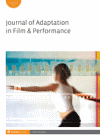
Journal of Adaptation in Film & Performance
Unveiling the Dynamics of Adaptation StudiesThe Journal of Adaptation in Film & Performance, published by INTELLECT LTD, serves as a pivotal platform for scholars and practitioners in the interdisciplinary realms of film studies and performance theory. With its ISSN 1753-6421 and E-ISSN 1753-643X, this esteemed journal aims to explore the dynamic processes through which adaptations transform narratives across various media, emphasizing the evolving dialogue between film and live performance. This journal not only addresses theoretical frameworks but also considers practical methodologies, establishing invaluable connections between adaptation studies and contemporary artistic practices. By fostering critical discourse and showcasing innovative research, the journal contributes significantly to the academic landscape, making it an essential resource for researchers, professionals, and students keen on understanding the nuances of adaptation within cultural contexts. Although it currently does not offer an open access model, its rigorous peer-reviewed approach ensures that published content meets high scholarly standards, further enhancing its impact in the field.

CLASSICAL ANTIQUITY
Celebrating the Enduring Influence of the AncientsCLASSICAL ANTIQUITY, published by the University of California Press, is a premier journal dedicated to the rigorous exploration of ancient history, literature, and culture. With an impressive impact factor and ranked #10 out of 170 in the category of Classics within Scopus, this journal stands in the top 94th percentile, signaling its vital role in advancing scholarly conversations in the field. Since its inception in 1982, CLASSICAL ANTIQUITY has fostered in-depth research and critical analysis, making it a cornerstone for scholars, professionals, and students alike. Though it operates on a subscription basis, the journal aims to disseminate comprehensive studies that bridge contemporary perspectives with classical heritage. With a Q1 ranking in the Classics category, it serves as an essential resource for anyone seeking to deepen their understanding of ancient civilizations and their lasting impacts on modern society.

Imago-Revista de Emblematica y Cultura Visual
Unveiling the Narratives Behind ImagesImago-Revista de Emblematica y Cultura Visual, published by Publicaciones Univ Valencia, serves as a vital platform for scholarship in the multidisciplinary fields of Visual Arts, Communication, and Linguistics. This Spanish journal has been recognized for its contributions to academic discourse, showcasing works that delve into the complexities of visual culture, emblems, and their interpretations within contemporary society. With an impressive ranking in Scopus, placing it in the Q2 category for Visual Arts and Performing Arts, and Q3 for Linguistics and Language in 2023, it stands out among its peers as a reputable source for researchers and scholars. Although it operates under a non-open access model, its content remains instrumental in advancing the understanding of visual narratives and their cultural implications. Located in Valencia, Spain, Imago not only reflects the academic rigor of its contributors but also fosters collaboration and exchange of ideas, making it an essential resource for professionals, students, and academics alike.

KOREA JOURNAL
Exploring the Depths of Korean Culture and ScholarshipKOREA JOURNAL, published by the Academy of Korean Studies, stands as a significant scholarly resource in the fields of Cultural Studies, History, Literature and Literary Theory, and Visual Arts and Performing Arts. With an impressive impact factor highlighted by its Q1 and Q2 quartile rankings across multiple categories, the journal facilitates the dissemination of innovative research that contributes to the understanding of Korean society and culture, offering a platform for both local and international scholars. Open Access since 2020, ensures that its articles are readily available to a wide audience, thereby promoting broader academic engagement. By featuring diverse interdisciplinary studies, the journal aims to bridge gaps across various fields and foster dialogue among researchers, practitioners, and students alike. Located in Seongnam-si, Gyeonggi-do, South Korea, it continues to play an essential role in advancing scholarship related to Korean studies while maintaining academic rigor and quality.
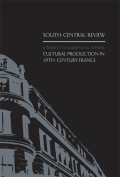
South Central Review
Fostering Scholarly Dialogue Across DisciplinesSouth Central Review, a distinguished academic journal published by Johns Hopkins University Press, serves as a vital platform for scholarly discourse in the fields of cultural studies, literature and literary theory, philosophy, and the visual and performing arts. With an ISSN of 0743-6831 and an E-ISSN of 1549-3377, this journal is dedicated to highlighting innovative research and critical analyses that explore the complexities of Southern culture and its broader implications. Although it operates without an open access option, the journal is recognized for its rigorous peer-review process and contributions to contemporary academic dialogue, holding Q3 and Q4 rankings across several disciplines as of 2023. The convergence of ideas and perspectives from diverse academic backgrounds positions the South Central Review as an essential resource for researchers, professionals, and students seeking to deepen their understanding of the cultural narratives shaping our world today.